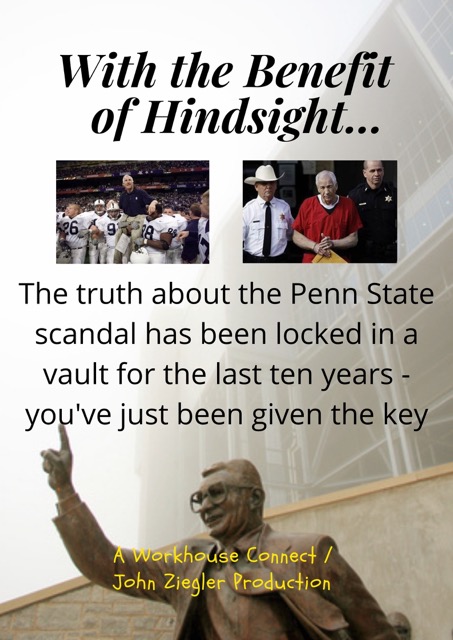Bumping this one, Jerry still fighting for his freedom

Here is the offical "trailer," which provides some background on the making of this unprecedented journalistic endeavor:
With the Benefit of Hindsight

Episode Seven: Wicked Tuna
With the Benefit of Hindsight...
With Aaron Fisher locked in as an accuser and the 1998 case with Zach Konstas resurrected prosecutors turned their attention toward finding additional accusers to add weight to their case. In Episode 7 Liz and Zig take us through the exhaustive process prosecutors undertake trying to locate additional accusers. The state was shocked by their lack of success and turned to the media to help them recruit. Patriot News reporter, Sara Ganim penned an article released on March 31, 2011 leaking the existence of a grand jury investigation into Jerry Sandusky. Prosecutors exploited the inexperienced Ganim by using her to leak confidential information into the public domain. Ganim went so far as to email Debra McCord, the mother of Zach Konstas warning her that if additional accusers did not emerge soon the case would be dropped. Magically, four additional accusers emerged shortly thereafter, each of who were known by Zach Konstas and appeared in a photo together in Jerry Sandusky's book Touched. Mark Pendergrast, author of the book The Most Hated Man In America is interviewed live by Liz and Zig. Pendergrast goes into detail about debunked Repressed Memory Therapy, a treatment that was used with almost all of the accusers and supposedly accounted for their evolving stories and testimony. We wrap the episode up with our first exposure to the incredible story of "victim" #4 Brett Houtz.Listen on Apple Podcasts: https://podcasts.apple.com/us/podcast/with-the-benefit-of-hindsight/id1562078872?i=1000521293124

Here is the offical "trailer," which provides some background on the making of this unprecedented journalistic endeavor:
With the Benefit of Hindsight
Episode Seven: Wicked Tuna
With the Benefit of Hindsight...
With Aaron Fisher locked in as an accuser and the 1998 case with Zach Konstas resurrected prosecutors turned their attention toward finding additional accusers to add weight to their case. In Episode 7 Liz and Zig take us through the exhaustive process prosecutors undertake trying to locate additional accusers. The state was shocked by their lack of success and turned to the media to help them recruit. Patriot News reporter, Sara Ganim penned an article released on March 31, 2011 leaking the existence of a grand jury investigation into Jerry Sandusky. Prosecutors exploited the inexperienced Ganim by using her to leak confidential information into the public domain. Ganim went so far as to email Debra McCord, the mother of Zach Konstas warning her that if additional accusers did not emerge soon the case would be dropped. Magically, four additional accusers emerged shortly thereafter, each of who were known by Zach Konstas and appeared in a photo together in Jerry Sandusky's book Touched. Mark Pendergrast, author of the book The Most Hated Man In America is interviewed live by Liz and Zig. Pendergrast goes into detail about debunked Repressed Memory Therapy, a treatment that was used with almost all of the accusers and supposedly accounted for their evolving stories and testimony. We wrap the episode up with our first exposure to the incredible story of "victim" #4 Brett Houtz.Listen on Apple Podcasts: https://podcasts.apple.com/us/podcast/with-the-benefit-of-hindsight/id1562078872?i=1000521293124






